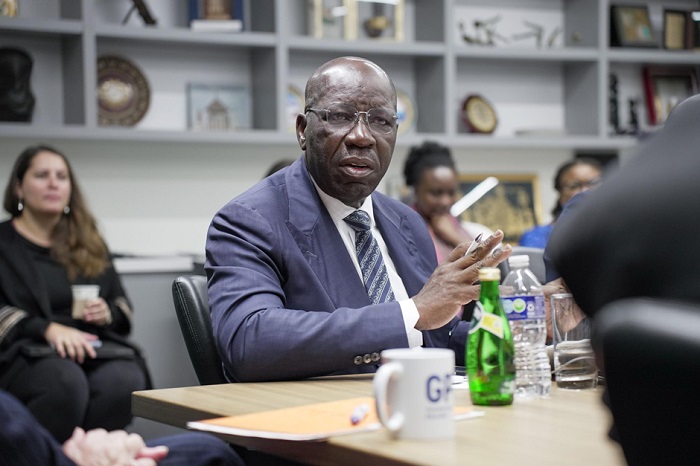Washington, DC – Governor Godwin Obaseki of Edo State, Nigeria, addressed an international audience at a Global Partnership for Education (GPE) event, sharing the successes and measurable impact of the Edo Basic Education Sector Transformation (EdoBEST) program.
The innovative reform model, initiated in 2018, has transformed Edo State’s basic education landscape, garnering attention as a model for educational reform on the African continent.
During his address, Governor Obaseki outlined EdoBEST’s strategic pillars, emphasizing the critical importance of data-driven governance, teacher development, and community engagement. He highlighted EdoBEST’s achievement in training over 16,000 teachers and significantly improving learning outcomes for more than 365,000 students in over 1,300 schools statewide.
“Our goal from the beginning was clear: to address the foundational challenges in our education system by focusing on teachers and creating a data-centric, supportive environment for learning,” Governor Obaseki said. “The result has been remarkable, with literacy and numeracy rates improving substantially. Today, our teachers are consistently present, motivated, and performing at the highest standards.”
Governor Obaseki’s dedication to foundational education reform has been instrumental in positioning Edo State as a leader in sustainable educational practices. He shared with attendees how the program has leveraged technology and local partnerships to reduce teacher absenteeism by achieving a record-high 87% teacher attendance rate—one of the highest on the continent.
“EdoBEST has become a lifeline for education in our state,” he stated, “by combining technology with teacher support, fostering accountability, and ensuring that classrooms are centers of learning and growth. This model has made education accessible and impactful, with the lowest rates of out-of-school children in Nigeria.”
Another key feature of EdoBEST’s transformation is the Edo Supporting Teachers to Achieve Results (Edo STAR) initiative, which focuses on supporting teachers and creating accountability systems to improve learning outcomes. Governor Obaseki highlighted that this focus has empowered teachers, creating a new sense of professionalism and pride in the teaching profession.
“Our teachers now call themselves ‘digital teachers’,” Governor Obaseki shared. “They have taken ownership of their role in shaping the future, motivated by a supportive system that rewards hard work, accountability, and dedication to their students.”
In response to questions about funding, Governor Obaseki explained that EdoBEST’s achievements were possible not through vast financial resources but through efficiency and commitment to sustainable reforms. “System transformation is about efficient use of resources,” he stated, “ensuring every naira counts and that we are maximizing value in every classroom.”
He also emphasized that EdoBEST’s success could be replicated across Nigeria, highlighting the need for state and national governments to commit to foundational educational reforms that align with global best practices.
“It is possible to transform education systems sustainably, without exorbitant costs,” he remarked. “What’s required is efficient, data-driven leadership committed to long-term development rather than short-term gains. EdoBEST is proof of what is achievable with a clear vision and a commitment to excellence.”
Governor Obaseki concluded by expressing his hope that EdoBEST would serve as a beacon for educational reform across Nigeria, inspiring other states to prioritize foundational education as the bedrock of socio-economic growth.


